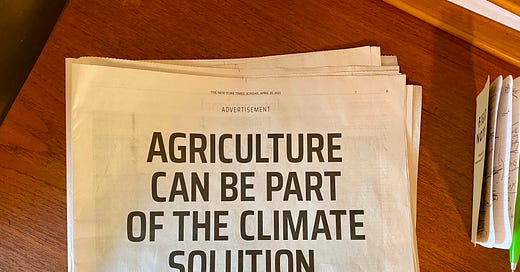The facts behind the food industry’s splashiest Earth Day ad
JBS promises it will stop destroying forests in 14 years...just 26 years after it made its first failed commitment.
For me, nothing disrupts a low-key Sunday morning like a full-page advertisement in the New York Times that boldly declares “Leading change across the food industry and achieving our goal of net zero by 2040 will be a challenge. Anything less is not an option.”
Especially when the ad was placed by JBS, a global meat company that produces the most emissions-intensive foods at a nearly unrivaled scale while maintaining a track record of buying political influence and driving environmental destruction.
In Brazil, its home country, JBS officials have been charged with bribing politicians to further their business interests and bribing inspectors to allow for the sale of rotten meat. Last year in the US, the company pleaded guilty on charges of paying $150 million in bribes to accomplish its aquisition of Pilgrim’s Pride. Pilgrim’s Pride also paid $110 million to settle unrelated charges of price fixing within the chicken industry.
“No responsible enterprise should be doing business with JBS. In addition to their rampant lawbreaking, JBS is one of the companies driving the destruction of the Amazon. Climate-changing deforestation and raging fires are clearing the way for more JBS cattle even now,” Mighty Earth Vice President and Global Director for Latin America Sarah Lake said in an October 2020 statement released in response to the latest bribery plea.
Based on estimates calculated by GRAIN, JBS’ operations produce the most greenhouse gas emissions of any agricultural company in the world. In some cases, those operations also pollute waterways, abuse animals, and exploit vulnerable workers and communities.
So, is this a major about-face for the agribusiness giant?
While last week I mentioned the fact that Earth Day promotions can be silly, this one is as serious as they come and deserves a closer look. Especially given it ran during the same week that conservative media and its followers were freaking out over a 100 percent false assertion made on Fox News that President Biden was about to limit Americans’ burger intake in the name of climate action.
Unwrapped
Let’s start with emissions. The ad says, “Bacon, chicken wings and steak with net-zero emissions. It’s possible.” How net-zero emissions is possible is not clear.
Further down, the ad states, “We will cut our own emissions by 30 percent by 2030.” That’s a concrete reduction target, but it’s misleading. On its website, JBS released a more detailed explanation of its climate commitments. There, the company clarifies, “JBS will reduce its global scope 1 and 2 emission intensity by at least 30 percent by 2030 against base year 2019.”
There are two important phrases there. First, they’re committing to reducing emission intensity, not absolute emissions. Emission intensity is the amount of greenhouse gases per unit of activity. So the company can continue to grow and expand leading to an overall increase in emissions, as long as it is making its operations more efficient. It’s easy to see how this makes sense from a business perspective, but it means the company is not reigning in its ability to produce even more meat in any way. By JBS’ own metrics, between 2017 and 2018, its absolute emissions decreased, but then they increased between 2018 and 2019, “mainly due to the acquisition of new operations by the Company, such as Tulip, in Europe.” The “net zero” target does apply to absolute emissions.
Now, what does “scope 1 and 2” mean? Scope 1 emissions are those directly created by a company, while scope 2 emissions are from energy purchased (like for electricity at offices and processing plants). Scope 3, which JBS did not include in the 30 percent reduction target, includes indirect emissions that happen within the supply chain. With the way the meat industry is structured, a large proportion of the emissions associated with beef, pork, and chicken would fall into that category. For example, many hog operations are owned by farmers who have contracts to sell their animals to JBS. So methane emissions from waste pools at their operations would fall into scope 3. And what about land use to grow feed for or raise animals later sold to JBS? Also likely scope 3.
In its 2019 annual report, JBS wrote that scope 3 emissions are “considered to be emissions over which the Company has no responsibility or indirect responsibility.”
Researchers at NYU recently looked at various meat company climate commitments in a research article published in the journal Climatic Change and found that approach to accounting is common. “In general, the companies emphasize mitigating energy use, with limited focus on emissions (e.g. methane) from animal and land management and land-use change, which make the biggest warming contributions in the agricultural sector,” they wrote.
What JBS’ climate announcement does say about scope 3 is that it “will invest $100 million by 2030 in research and development projects,” which will “contribute to reducing scope 3 emissions across the value chain, in our efforts toward net zero.”
I reached out to JBS, and a spokesperson said that the company is, in fact, now undergoing “a science-based targeting process to define our scope 3 emissions and will provide reduction targets for this important scope.” He added that the net zero target does include scope 3, and that “our goal is to define Scope 3 emissions for our value chain and track and transparently report our reduction progress. As you likely know, scope 3 is the most difficult area for our industry to collect and track data around, due to the complex nature of the supply chains. We look forward to providing more details as they become available.” That’s definitely a change in tune; what it will really mean on the ground remains to be seen.
And the company’s record of meeting commitments is less than stellar. Another claim: “JBS will eliminate illegal Amazon deforestation from its supply chain – including the suppliers of its suppliers – by 2025, and in other Brazilian biomes by 2030. The company will achieve zero deforestation across its global supply chain by 2035.”
The last time the company signed an agreement to stop Amazon deforestation was in 2009. Now, it’s saying it will get to it in 2025. And remember those horrifying fires in the Amazon in 2019? Mighty Earth linked JBS production to multiple fire hotspots. On its Soy and Cattle Deforestation Tracker that looks at data from the past two years on deforestation in the Amazon and Cerrado (another critical ecosystem), the organization ranks JBS number one, a status that is supported by other sources. “JBS is connected to the most clearance by far—a whopping 100,000 hectares, an area larger than Berlin—about 75 percent of which occurred in protected areas and, thus, is presumably illegal,” Mighty Earth team members wrote in a report released this month.
In other words, the company is saying it will stop destroying South American forests in 14 more years, by 2035, even though it said it would stop destroying one of those forests 12 years ago and did not. The spokesperson referred to a sophisticated monitoring system developed by JBS Brazil to track “100 percent of its direct suppliers in the Amazon,” and attributed continued deforestation to the difficulty involved in tracing cattle from “indirect suppliers.” He also mentioned a specific tool called the “JBS Transparent Livestock Platform,” based on blockchain technology, that the company says will be used to trace all direct and indirect suppliers, “allowing us to effectively exclude illegal Amazon deforestation from our supply chain.”
Okay, we’ll see. The fact remains that for meat company executives, developing tools to even be able to trace their own cattle supply is something they can decide to do if they feel like it (or not). Same goes for climate commitments. Fox News’ fabricated story about Biden limiting burger intake is funny for how wrong it is; for all of the rhetoric and proposals on climate action so far, the administration has steered fully clear of regulating agriculture in any way. In every conference and meeting I’ve reported on, government officials and lawmakers have repeatedly said they will only support “voluntary” agricultural climate solutions.
Governments are not holding meat companies accountable for environmental degradation or regulating emissions, and they haven’t for a long time. As long as that’s the case, climate commitments will make for splashy advertising that requires a deeper look.
Wrapped up, to go
*JBS’ offices may rely less on fossil fuels in the future (great), and the company has changed its tune on its responsibility for scope 3 emissions. But there is no evidence that the company is planning to change the production system in a way that will meaningfully reduce emissions or other negative environmental impacts related to the meat itself. And its track record on meeting past deforestation commitments is terrible.
*Beef, produced the way JBS and other big meatpackers do it, has the highest climate footprint. Reducing its production would be the most effective solution.
*Trust what meat companies do, not what their advertisements say.
A side of policy
Busy bees. The new leadership at USDA has been cranking out announcements and changes to a wide spectrum of programs. In the past week it extended P-EBT, an emergency program established for kids missing meals due to COVID-19 and extended waivers to allow schools to continue serving free meals with more flexibility through the 2021-2022 school year. It also expanded the Conservation Reserve Program, which pays farmers to take land out production and announced a new climate initiative called AIM for Climate.
Let’s be friends
I’ve been so swamped this week I barely had time to read things to recommend to you and also forgot to pay attention to what I ate. So I’ll leave you with this picture of Morris, who looks at everything and everyone—including meat companies—with skepticism.
Follow me on Twitter and Instagram to continue the conversation. See you next week!







